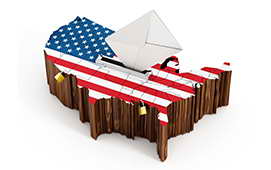July 15, 2016
7/15: Clinton and Trump Competitive Nationally
McClatchy/Marist National Poll
In the race for the White House nationally, presumptive nominees Democrat Hillary Clinton, 42%, and Republican Donald Trump, 39%, are closely matched among registered voters nationally. 13% say they would not support either candidate, 1% backs someone else, and 4% are undecided. When McClatchy-Marist last reported this question in April, Clinton, 50%, was ahead of Trump, 41%, by nine points among the national electorate.
While a partisan divide exists, there is little consensus among independent voters. 36% of independents say they would vote for Clinton while 33% would support Trump. A notable 23% of independents say they won’t support either candidate. Among Democrats, 83% are behind Clinton while a similar proportion of Republicans, 85%, back Trump.
A gender gap is present. A slim majority of women voters, 51%, support Clinton while a plurality of men, 47%, is for Trump. Interestingly, 16% of men say they do not support either candidate. Differences also exist between white voters with a college degree and those without a college education. A majority of white voters without a college education, 56%, support Trump. Among white voters who are college graduates, 45% back Clinton to 41% for Trump.
“Both candidates need to step up their game during their respective conventions,” says Dr. Lee M. Miringoff, Director of The Marist College Institute for Public Opinion. “They have an opportunity to turn around the negative impressions many voters have of each of them.”
However, the national electorate is not overwhelmed by either Clinton or Trump. 49% of Clinton’s supporters report they chose her because they are for Clinton while 48% say they made their selection because they are against Trump. Notably, 37% of Democrats and 70% of independents who support Clinton say they are ‘with her’ because they oppose Trump.
Among Trump’s backers, a majority, 56%, made their selection because they are against Clinton while slightly more than four in ten, 41%, are behind Trump. Looking at party, 51% of Republicans and 69% of independents who are Trump supporters say they made their choice because they are against Clinton.
To make matters worse for both Clinton and Trump, their favorable ratings are upside down. Nearly two-thirds of adults nationally, 64%, have an unfavorable opinion of Trump while a similar 60% have a negative opinion of Clinton.
When Gary Johnson, the Libertarian, and Jill Stein of the Green Party are included in the presidential tossup, Clinton receives the support of 40% of voters to 35% for Trump. Johnson garners 10% of the national electorate while 5% back Stein. Two percent support someone else, and 9% are undecided. Of note, more than one in four voters who report they supported Vermont Senator Bernie Sanders during the Democratic contest say they are for Johnson, 14%, or Stein, 13%. Similarly, about a quarter of voters who backed a Republican other than Trump in the primaries report they plan to vote for Johnson, 19%, or Stein, 5%.
Do voters think it matters if Clinton or Trump is elected in November? Nearly three in four voters, 73%, say it makes a big difference, and an additional 14% report it makes some difference. One in ten members of the electorate, 10%, says it does not matter at all. In 2012, 60% of voters nationally thought in mattered a great deal who was elected president.
Looking at the issues, more than six in ten voters, 61%, put greater trust in Clinton to handle the treatment of Muslim Americans in this country. More voters have greater confidence in Clinton than Trump to handle issues facing gay, lesbian, and transgender Americans, 59%, immigration, 54%, illegal Mexican immigrants, 54%, and gun violence, 50%. The national electorate divides about whether Clinton or Trump is more trusted when it comes to negotiating fair trade policies, the war against terrorism, the separation between Church and State, and the creation of good jobs.
When it comes to the qualities of the candidates, Clinton is overwhelmingly perceived as the candidate who has the experience to be president, 60%, and a majority, 56%, reports she has the temperament to be president. Clinton is also thought to be the candidate who cares about the average person, 45%, and who shares voters’ values, 43%. The national electorate divides about whether Clinton or Trump is better described as honest and trustworthy or who is closer to them on the issues. 22% say neither candidate is honest and trustworthy.
Complete July 15, 2016 McClatchy-Marist Poll of the United States




